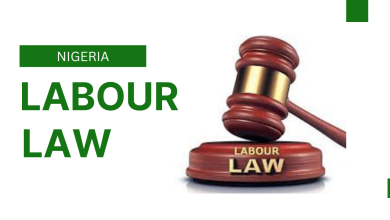How Business Owners Can Handle Employee Disputes Legally
Practical steps Nigerian employers can take to resolve workplace conflicts without breaking the law

Every workplace will, at one point or another, experience disagreements. Sometimes it is as simple as a misunderstanding about job roles. Other times, it is as serious as accusations of unpaid salaries, wrongful termination, or harassment. For business owners, how you handle these disputes says a lot about your professionalism and can even determine the survival of your business.
In Nigeria today, the law provides clear structures for addressing employee disputes. The challenge for many business owners is knowing when to settle issues internally and when to allow the law to take its course.
Why Employee Disputes Matter
A dispute with an employee is not just a “personal issue.” It can affect team morale, public reputation, and in some cases, bring costly legal action against the business. Poorly managed conflicts often result in strikes, lawsuits, or high staff turnover, all of which are more expensive than simply handling matters properly from the start.
The following are steps that business owners can follow to manage disputes with employees:
Step 1: Establish Internal Resolution Mechanisms
Before conflicts get out of hand, every business should have a clear grievance procedure. This could include:
- Allowing staff to report complaints confidentially.
- Setting up HR or a neutral manager to mediate.
- Having a written disciplinary and grievance policy.
Step 2: Know the Relevant Laws
In Nigeria, labour laws shape how businesses and employees interact daily. For example, the Labour Act sets out what a valid contract should contain, how wages must be paid, and what conditions are acceptable. Also, the Trade Disputes Act offers a path for mediation and arbitration when conflicts break out. When conflicts escalate beyond mediation and arbitration, the National Industrial Court is the only court empowered to decide such matters.
For business owners, this doesn’t mean you need to memorize every statute. What matters is being aware that these frameworks exist and knowing when to seek advice. Many mistakes that can be avoided happen simply because an employer acted in ignorance of the law.
Step 3: Keep Proper Records
The importance of proper record keeping in business administration cannot be overemphasised. It has always proven to be the biggest distinguishing factors between disputes that get resolved quickly and those that drag on for years. Imagine being accused of failing to pay salaries of which you denied, but you have no evidence of bank transfers or signed payslips. The case immediately tilts against you.
Employment letters, payment records, warning notices, and even minutes of meetings should be kept. These may feel like minor details in the moment, but they become powerful shields if the matter ends up before a mediator or in court. Hence, proper documentation is very important, not because of now, but rather for any future occurrence.
Step 4: Consider Peaceful Settlement First
Not every disagreement has to end in a courtroom battle. In fact, the Nigerian judicial system encourages both sides to first try negotiation, mediation, or arbitration before filing a lawsuit. An interesting fact is that these approaches are generally cheaper, quicker, and less damaging to workplace relationships.
Take, for example, a situation where an employee feels wrongfully suspended. Sitting down with a mediator might resolve the issue in a week. Dragging the same case to court could take years, with both sides spending more money than the original dispute was worth.
Step 5: When the Courts Become Inevitable
The harsh reality, at times, is that there are cases that simply cannot be resolved internally or through ADR. Issues of large-scale unpaid wages, union disputes, or cases involving allegations of discrimination or harassment may end up before the National Industrial Court. This is not a sign of failure on the part of the business owner, it is simply the final stop in the legal process.
The important thing is to approach the court prepared, with your documents intact and your story consistent. Employers who acted fairly from the beginning usually find that the law works in their favour.
Conclusion
Workplace disputes are not a sign that a business is failing; they are part of managing people. What distinguishes smart employers from the rest is how they respond when issues arise. Business owners, by being conscious of the law, keeping thorough records, and embracing dialogue before litigation, can protect both their company and their reputation.
It is also very important to point out that handling disputes legally is not just about protecting your rights. It is about creating a culture of fairness that attracts and retains good staff, the kind of culture that fuels long-term growth.




